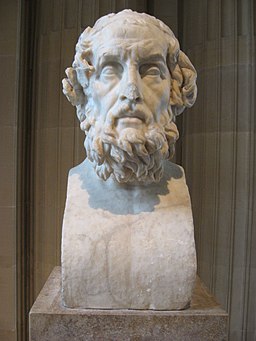 |
| Picture by Hay Kranen / PD via wiki commons |
Part of this, I know, is related to the culture. Having your name remembered, even after your death, was a big deal. Going through the trouble of mapping out the ancestry of each particular hero could easily have been a gesture of respect to those ancestors and the hero himself. Not only that, but it's possible that some of his audience might have claimed descent from these same heroes, and in those cases they were certainly more likely to be recognized and the recitation would have carried that much more weight. From a strictly storytelling angle, it makes sense that Homer would want to make each of these men more sympathetic -- instead of a faceless, characterless name, with the inclusion of the genealogies of those fighting and dying, these warriors and soldiers become someone's son, someone's father, someone's husband, or long lost cousin, or shared ancestor. It humanizes the death and horror and glory of war in some small way, perhaps.
The fact that Odysseus ends up with an epic poem named for him and his journey home makes me wonder if we're missing a lot of other, smaller, tales as well. Stories and poems that go with, perhaps not every one of the characters named and described in depth, but many of these other men who go to their deaths in this war. Agamemnon does seem to have at his disposal a large number of men capable of heroic feats. An incredible number of kings and allies. What if these other characters and secondary heroes were adapted and created for the regional audiences? A poet in Sparta, might emphasize the Spartan contingent of warriors and heroes. If the poet is in the islands, he talks up the Ithacans or whichever other men are from the area. What if this is just another part of the catalog, depending on the audience that was listening, drawn from and excised as necessary for each regional retelling?
And isn't that one of the rules for writing? Know Your Audience! I can't imagine Homer wouldn't have taken that into account, that any bard wouldn't have lived and died by that same law. Even if the laws of hospitality were sacred, accidents could still happen, and I can only imagine they might have happened with greater frequency to men who offended the kings who hosted them.

just because you have adhd doesn't mean we all have adhd--yes there are a lot of characters, but homer's audience *proabably* were not hearing about these characters for the first time in his work...
ReplyDeleteI mentioned in the second paragraph:
Delete"Not only that, but it's possible that some of his audience might have claimed descent from these same heroes, and in those cases they were certainly more likely to be recognized and the recitation would have carried that much more weight."
Without any question, Homer's audience was a lot more familiar with these characters than we are today -- and I'm a lot more familiar with them now than I was when I first read the Iliad, and even than when I read it for the second time, but coming from the perspective of a writer and a reader of fiction, it's a lot of information which buries the narrative.
From the perspective of a classicist, I fully appreciate the importance of those genealogies, which I also mention above, and I can see more than one application and use for the bards in their recitations. It makes sense from a cultural and historical perspective, absolutely.